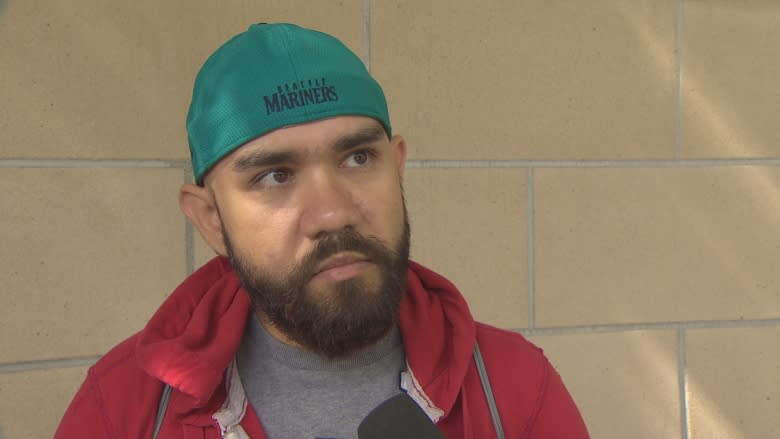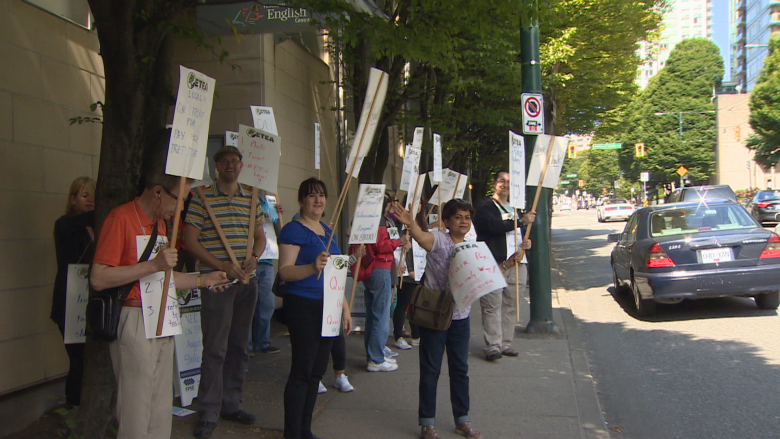Vancouver ESL school closes suddenly, 600 students out of class
The sudden closure of a Vancouver language school has left 600 students out of class, and almost 100 school staff out of a job.
Teachers at Vancouver English Centre (VEC), an English as a second language (ESL) school in downtown Vancouver, have been on strike for the last four weeks, seeking their first collective contract.
Union representatives say they showed up to the school at 9 a.m. Friday morning for a private mediation session, but instead found a group of confused students and staff gathered outside. A note had been posted saying the school was closed, and was unlikely to reopen.
Hector Diaz, a VEC student visiting from Mexico, says the school has yet to refund his money despite repeated requests throughout the strike. Now that the school is closed, he has no idea what to do.
"I came here to study but now I don't have any money to take another course, because they have my money," Diaz said.
"I travelled miles away from my country, and this is a bad situation that I am [in]."
Before the strike, the school had about 600 students enrolled — all of whom have been left with no explanation for the sudden closure, no contact information, and no refund.
Ken Gardner, president and owner of VEC, was contacted by the CBC for comment, but did not respond by deadline. A copy of the closure notice was posted on the school's Twitter page.
Teachers were prepared to compromise
Kim Fissel is the interim president of ETEA Local 9, the union representing VEC's teachers. She said after four weeks of job action, the union had come prepared Friday morning to make some concessions.
"We had decided, in order to try and allow the school to stay open, allow these students to get what they paid for and allow more than 45 teachers to keep their jobs, we would counter [our own initial offer]," Fissel said.
"I've got teachers asking me what happens next, because they've got years invested in the school," she said. "In one case we have one teacher who's been there 18 years."
"This didn't have to happen."
The strike came after 15 months of failed contract negotiations and mediation. Teachers had been asking for wages comparable to other schools the union represents, as well as pay for time spent preparing for class.
Lack of accreditation leaves students with few options
VEC was a founding member of Languages Canada, a non-profit organization that oversees ESL schools across the country. But Languages Canada says VEC lost its membership several months ago after it stopped paying dues.
VEC never became a member of the Private Career Training Institutions Agency (PCTIA), a provincial government regulatory body founded in 2004 to set education standards for ESL schools.
Since VEC is not under the jurisdiction of either Languages Canada or PCTIA, Fissel says students can't appeal to those bodies for help to get their money back.
"The students unfortunately will have to go after [VEC] legally, and as I understand, individually," she said. "They might be able to get a class action together, but they don't really have a lot of options."
ESL schools do not fall under the definition of "career training" provided by the provincial Private Career Training Institutions Act, so registration with PCTIA is not required to operate an ESL school in B.C.
"This particular result really shows why [accreditation by] PCTIA should not be voluntary," Fissel said. "This is going to do all kinds of damage to the reputation of people involved in this."
None of this is particularly comforting for Diaz. Like many VEC students, he's in a foreign country on a short-term visa. He's only here until December, he's not familiar with the local legal system, and he says the Mexican consulate has so far been unable to help.
He's also down more than $5,000 in tuition fees paid to VEC.
"I don't have any money to spend on any lawyer," Diaz said.
"I don't know what to do. I don't know if I can apply for any legal service. I'm totally lost."



